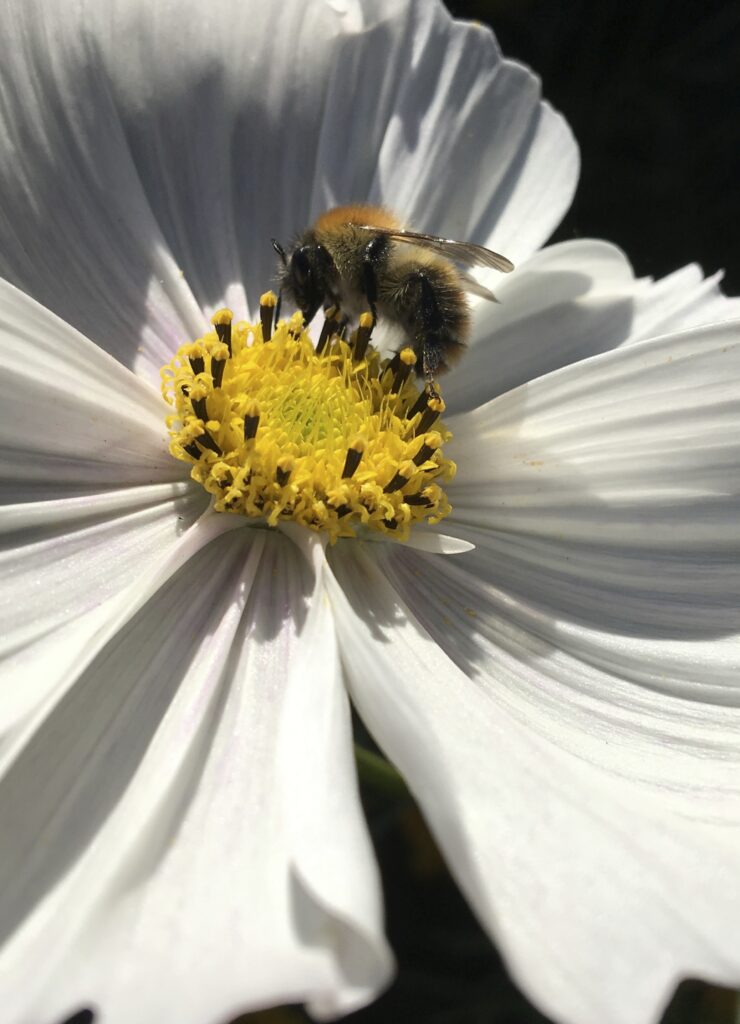Why are bees important?
What did you have for breakfast today? Granola with fruit? Jam on toast? Maybe a fry-up with grilled tomatoes? Perhaps all washed down with a fruit juice or tea or coffee? The natural behaviour of pollinating insects such as bees, hoverflies, butterflies, beetles and even moths created these products. Without these industrious little workers, much of what we eat would not ex-ist. Research has also revealed that plants pollinated by bees grow stronger and have better quality fruit, enabling successive bee generations to stay strong too.
The bad news?
Bees have been around for millions of years, but in the last 10 years their numbers have plummeted. In the UK there are an amazing 230 species divided into three types, the fat bumblebee, the tiny solitary bees and the well known honey bee. Incredibly, none are pro-tected by law. Scientists say habitat loss and pesticides have had the largest impact on bee numbers, and bees are struggling to cope. Since the 1930s Britain has ploughed up or built upon 97% of its wildflower meadows and grasslands, and the use of pesticides on remaining land has rocketed.
In 2019 a study showed a third of wild British bees are in serious decline, with all species in decline overall. It is estimated every square kilometre of land in the UK has lost an aver-age of 11 species of bee and hoverfly since the 1980’s, and the loss is speeding up, which leaves a natural world that is fundamentally poorer and less able to adapt to further chang-es, such as global warming. Global warming has been shown to affect flowering times, and with little or no food available bees can starve. Bees naturally pollinate plants as they feed. Without this essential service, the repro-duction of plants, flowers and fruit means other wildlife could die out too. The loss of such a fundamental foundation in the way nature functions is likely to create catastrophic problems in the not too distant future to the human food chain as well as the economy. With seven bil-lion humans on this planet and rising, food is a serious issue.
The good news?
You can help. Despite the out-look for bees being quite bleak right now there is a lot you and local communities can do to help. Different bees have dif-ferent mouthparts so not all can feed on the same flowers. The secret to attracting many bees is to grow a wide variety of flowering plants with open shapes, that flower at different times of the year from Spring through to Winter. If you also provide places to nest and rest, bees can thrive.
The following species are great for bees – Lavender, Scabious, herbs such as Rosemary, Thyme or Mint, vegetables such as tomatoes, potatoes and courgettes. Buddlia, fruit trees such as apple or cherry, strawberries and rasp-berries along with wildflower mixes. Fox-gloves are a favourite, as are crocus, Aubretia, Borage, Honeysuckle, Snapdragons and Se-dum.
There are other things you can do to help:
– Don’t use pesticides in the garden, particu-larly on flowering plants. Studies have shown gardens that use pesticides are virtually de-void of life except pests, and yet pesticide free ones have more variety and fewer pests be-cause natural predators can survive.
– Join Bug Life, the worlds only insect conser-vation charity, or your local Wildlife Trust
– Campaign for garden centres to sell organic plants – see the Bumblebee Conservation Trust website https://www.bumblebeeconservation.org
– The Wildlife Trusts have excellent booklets and advice about bee gardening on their web-site https://www.wildlifetrusts.org

